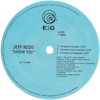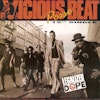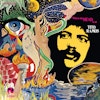Cookout classics like “I Found Lovin’ ” and “You Called and Told Me” earned Jeff Redd considerable brass under the new-jack-swing regime. But when the time came to record a follow-up to 1990’s hit-laden A Quiet Storm, Redd envisioned a body of music more Marvin than “Motownphilly.” He enlisted keyboardist/producer Dinky Bingham, who, using natural and artificial flavors, followed Redd’s melodic cues to craft the playfully awkward, yet structurally sound, “Show You.” Vocally, Redd’s tender confessionals were delivered with supreme control, the inventive cadence complementing the unpredictable nature of the instrumental. Drum patterns and coloring courtesy of Lord Finesse would help the track gel, breaking common ground between ballad and banger. “I actually even rapped on it,” declares Finesse. “I don’t got that version,” he laments, “but the rhymes was nasty.”
“We didn’t say, ‘These are hits,’” confesses Redd of the writing process. “We just said, ‘They hot.’” A refreshing disinterest in industry, even audience acceptance, was a unifying ethos among the participants. Finesse maintains, “We didn’t think about, ‘Oh, let’s get played on the radio,’ or ‘Will this cross over?’ That’s what makes that music special, because we went with what we felt—and we felt it.” Not too hard, not too soft, it seemed that Jeff Redd’s tentatively titled On the Down Low would lay the cornerstone for a new movement—one where young-folks music and grown-folks music collided. But when EMI shuttered their Black music department, Down Low was left without a home.
“I’m going to blame it on the record companies,” says Bingham of the team’s thwarted efforts. “Jeff Redd basically would have created neo-soul had his album blown up. The record companies were scared to take a chance. But as soon as D’Angelo came out? He had an A&R who cared; he had an A&R who said, ‘I’m taking the chance.’”
Although Redd transitioned to a successful A&R position at MCA, he’s remembered best as a performer, a career he has recently resumed. “You know, when you don’t have big sales,” he says, “you think that it was just a flop. Then you find out years later that people wanted that record, that people wanted you to come overseas. That’s what we’re working on now. I want to do Japan, I want to do London, Amsterdam—I want to do all those places. And I’m going to.”


